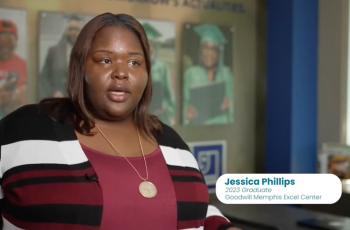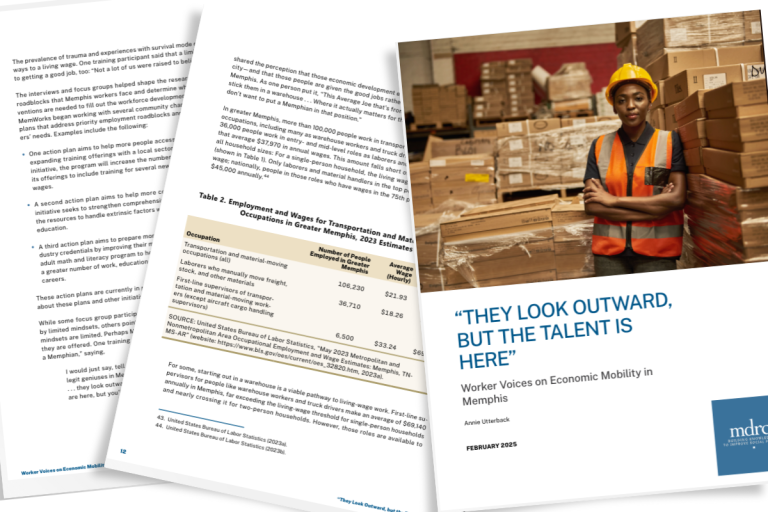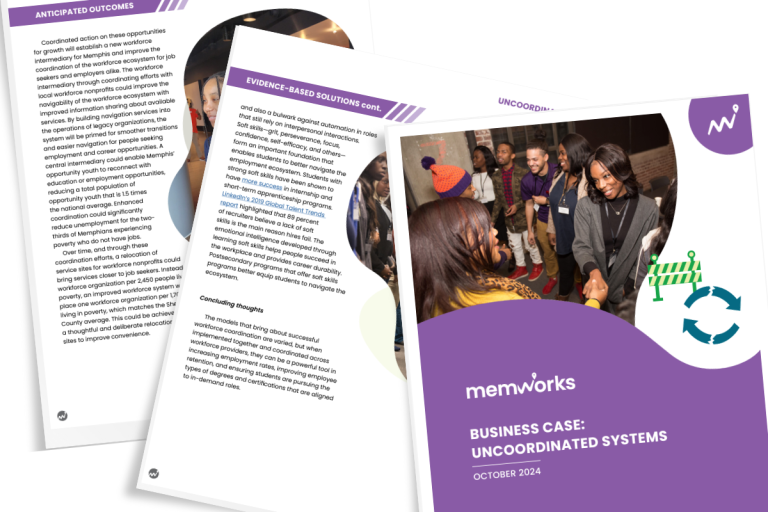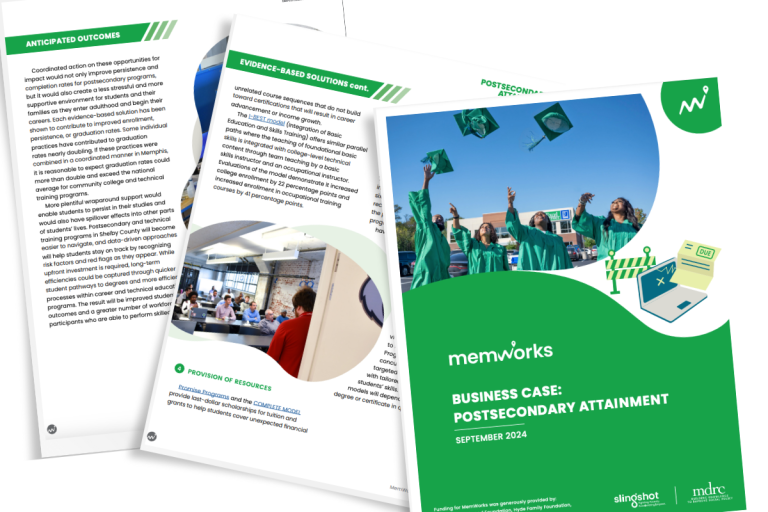Women like Jessica want better for their families. After a teenage pregnancy took Jessica out of her traditional school setting, she’s faced additional obstacles including obtaining childcare and transportation while earning enough to meet their basic needs. She’s managed to do this while attending classes at The Excel Center to earn her high school diploma. The weight of responsibilities exhausts her, but she does it to fulfill her dream of becoming a nurse and giving her children a better life.
It may surprise many that half of Memphians experiencing poverty are employed or looking for work. Unfortunately for many, even full-time employment is not necessarily a pathway out of poverty. 12 percent of employed Memphians still experience poverty. One person told MemWorks:
“I mean, since I was 17 years old, I’ve never had a problem getting a job. The problem is it’s a low-paying job. . . .And then when you are applying to jobs five, and six, seven times, and you know you’re qualified, but they still won’t hire you. And then when you do get hired, they don’t wanna pay you.”
– Training Participant
Living Wage Employment:
An income of $9.73 per hour does not constitute a living wage in Memphis, yet this is the median income for the over 200,000 Memphians. People working in low-wage occupations without defined career paths and opportunities for increased income become trapped. They cannot afford to leave work to obtain additional certifications or education for a higher-wage job, but their existing job also does not confer enough income for them to support themselves.
Sixty percent of Memphians experiencing poverty are women. Consider the compounded obstacles for a single parent with two kids making $9.73 per hour. In addition to finding accessible, affordable childcare, the parent would need to work nearly 57 hours per week to earn enough funds to support his or her family. For over a decade, Memphis has had the highest or second-highest overall poverty and child poverty rates among U.S. metropolitan areas with a population greater than one million. Mothers like Jessica, seek degrees and certifications to change their kids’ outcomes.
Education Needs:
Many see education as the road out of poverty, a ticket to a career with a living wage. However, the reality is that Memphians across all levels of educational attainment experience poverty at nearly twice the rate of those in Tennessee. More than three-quarters of Memphians living in poverty have a high school diploma and 38% have some post-secondary education.

6 in 10 Tennessee community college students experiencing poverty do not continue after the first year. Sabrina Dawson, Co-Founder and Vice President of Programs for The Collective Blueprint shared how numerous compounding factors, such as incidental life expenses and inefficient enrollment processes, can undermine program completion.
“There are so many obstacles and so many barriers that young adults face. So many decisions like do I pay this light bill or do I spend the money on an Uber to get to class.”
– Sabrina Dawson, Co-Founder and Vice President of Programs for The Collective Blueprint
Basic Needs:
Food insecurity and unstable housing arrangements make it nearly impossible to pursue workforce development services, education, and employment. The MemWorks research has provided a clear picture of the basic needs obstacles facing 1 in 3 Memphians experiencing poverty or at risk of poverty.
- Almost 250,000 people in the Memphis metropolitan area struggle with food insecurity
- Shelby County residents spend on average 53 percent of their income on the combined costs of housing and transportation.
- 25,000 Memphians receive eviction filings annually
For the hundreds of thousands affected, this scarcity of basic needs perpetuates a level of toxic stress that affects their ability to secure and retain career track employment. One person interviewed for MemWorks had this to say about living in poverty.
“It is like entrapment, but it’s like, what did I do to become trapped? . . .Like, what did I do? What did I personally do that I can’t advance myself in this way?”
– Training Participant
By leveraging evidence-based practices and policies we can create an ecosystem that provides support, career paths, and opportunities for increased economic mobility.






